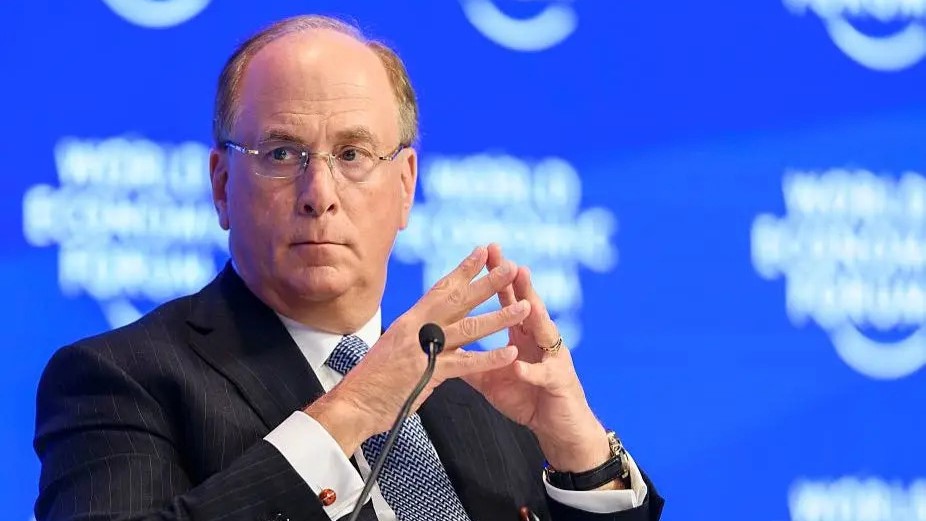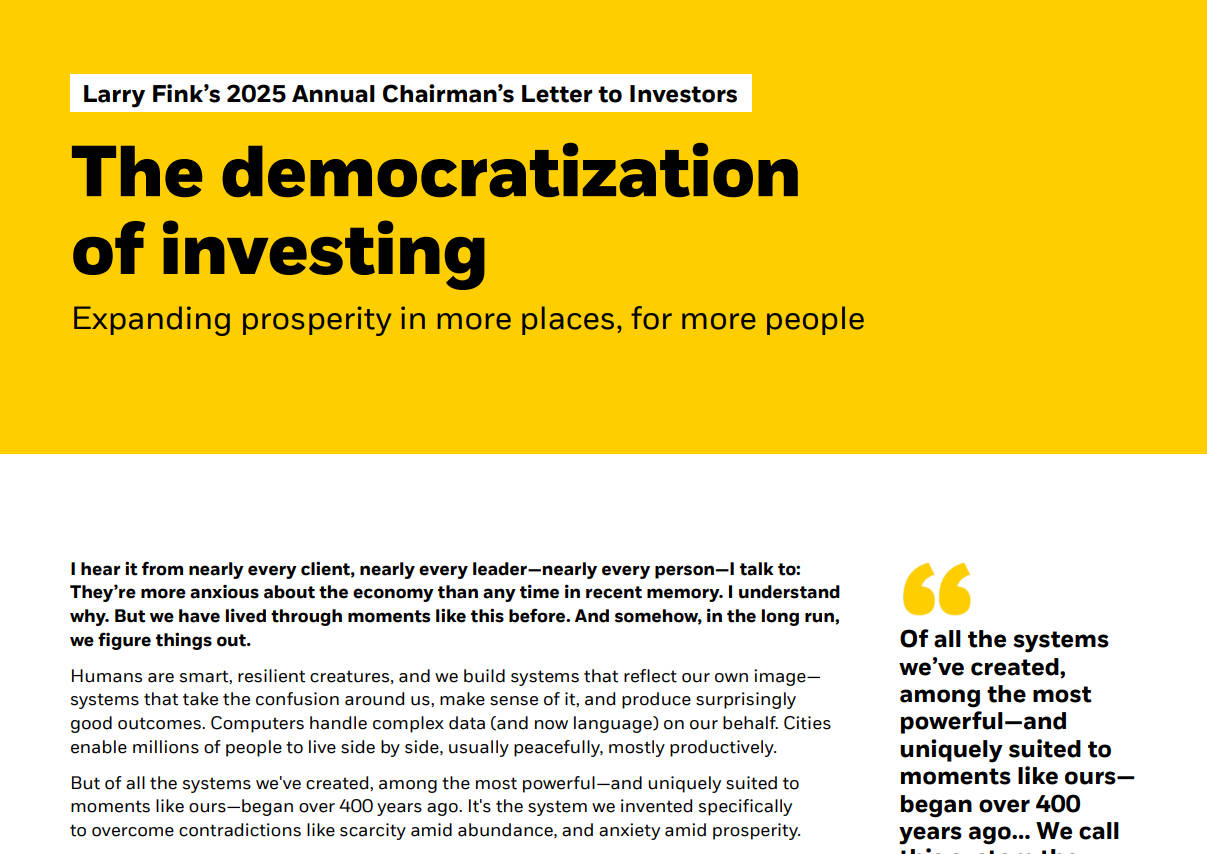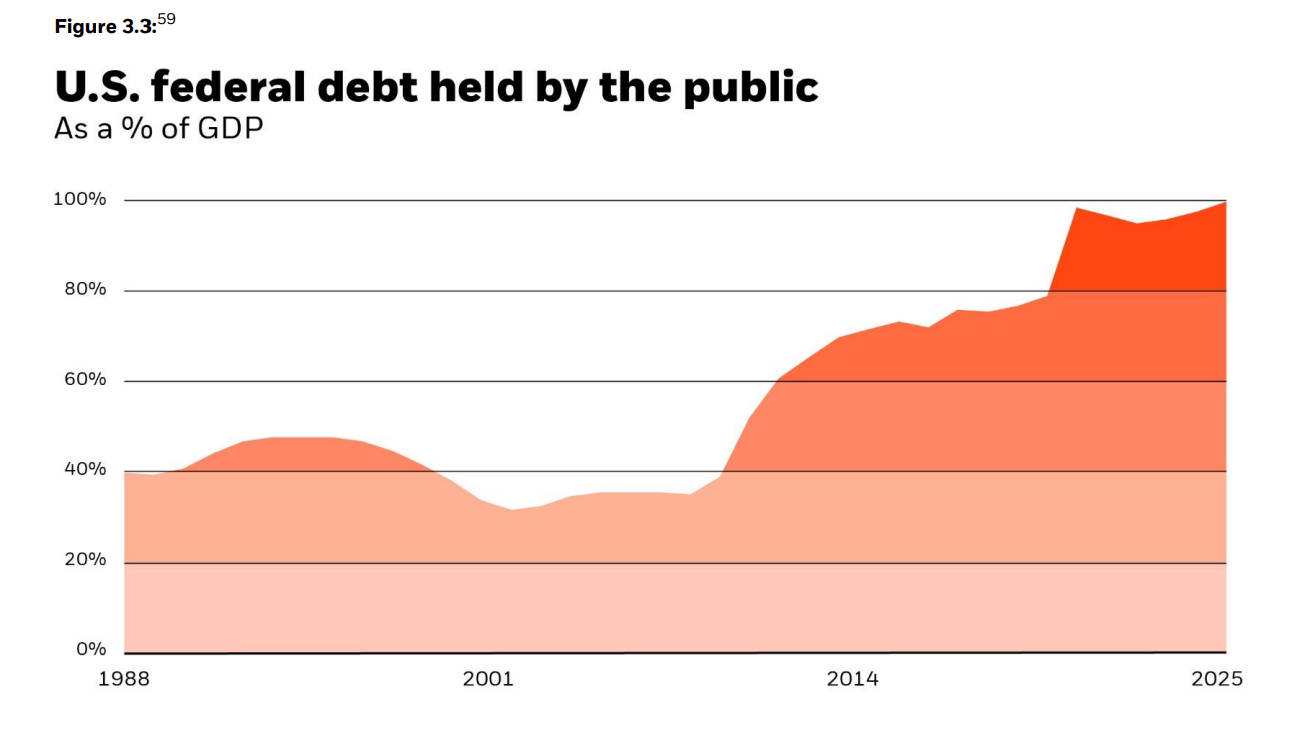
Author: Weilin, PANews
On March 31, Larry Fink, CEO of BlackRock, one of the world's largest asset management companies, released a 27-page annual letter to investors. In this letter, Fink issued a rare warning: if the United States cannot control its expanding debt and fiscal deficit, the dollar's decades-long status as the "global reserve currency" may eventually give way to emerging digital assets like Bitcoin.

Bitcoin May Undermine the Dollar's Reserve Currency Status
On page 20 of the report, Fink posed a thought-provoking question: "Will Bitcoin undermine the dollar's reserve currency status?"
He stated that for decades, the U.S. has benefited from the dollar's status as the global reserve currency. However, this status is not guaranteed forever. Since the "debt clock" in Times Square started ticking in 1989, the growth rate of U.S. debt has been three times that of GDP. This year, interest payments alone will exceed $952 billion, surpassing defense spending. By 2030, mandatory government spending and debt service will consume all federal revenue, leading to a long-term deficit.

Publicly held U.S. federal debt as a percentage of GDP
While warning of the risks in traditional finance, Fink also made it clear that he does not oppose the development of digital assets. He wrote: "It should be noted that I am clearly not against digital assets. But two things can be true at the same time: decentralized finance is an extraordinary innovation. It makes markets faster, cheaper, and more transparent. However, this innovation could also undermine America's economic advantage—if investors begin to believe that Bitcoin is safer than the dollar."
Reflecting on performance, Fink noted that BlackRock's Bitcoin ETF has become the largest exchange-traded product launch in history, surpassing $50 billion in assets under management in less than a year. IBIT ranks as the third most attractive product in the entire ETF industry, second only to the S&P 500 index fund. More than half of the demand comes from retail investors, with three-quarters from investors who had never held iShares products before. This year, BlackRock has expanded its Bitcoin products to exchange-traded products (ETPs) in Canada and Europe.
Fink further pointed out that ETFs have not only achieved great success in the U.S. but are also becoming a key tool for driving the development of investment culture in Europe. He stated that many first-time entrants to the capital markets in Europe are taking their first steps through ETFs, especially iShares products. Currently, only one-third of European individual investors participate in capital market investments, a figure far below the over 60% in the U.S. This not only causes them to miss out on growth opportunities provided by the capital markets, but in a low-interest-rate environment, their savings account returns are often eroded by inflation.
To increase this ratio, BlackRock is collaborating with several established institutions and emerging platforms in Europe, such as Monzo, N26, Revolut, Scalable Capital, and Trade Republic, to lower investment barriers and enhance local financial literacy.
Advocating for RWA, Clearly Stating Tokenization is the Financial Future's "Highway"
Extending from ETFs to the currently popular crypto technology, Fink believes that tokenization is becoming a key force in reshaping financial infrastructure.
He wrote that the flow of global funds today still relies on the "financial pipeline" established in an era when trading floors relied on shouting orders and fax machines were considered revolutionary tools. Take the Society for Worldwide Interbank Financial Telecommunication (SWIFT) as an example—it supports trillions of dollars in global transactions daily, operating more like a relay race: banks pass instructions in sequence, carefully checking details at each step. In the 1970s, when market sizes were smaller and trading frequencies lower, this relay method was reasonable. But today, continuing to rely on SWIFT is as inefficient as sending emails through the post office.
While this system was reasonable in the past, its efficiency can no longer support the demands of a globalized and digitized financial landscape.
In Fink's view, the emergence of tokenization will fundamentally change this inefficiency. If SWIFT is postal service, then tokenization is the email itself—assets can flow directly and in real-time, bypassing all intermediaries.
Fink further described how tokenization could profoundly change the financial ecosystem, undoubtedly favoring the RWA market. "It is the process of converting real-world assets (such as stocks, bonds, real estate) into digital tokens that can be traded online. Each token represents your ownership of a specific asset, like a digital certificate of ownership. Unlike traditional paper certificates, these tokens are securely stored on the blockchain, making buying, selling, and transferring instantaneous, without cumbersome paperwork and waiting times. Every stock, every bond, every fund—every type of asset can be tokenized. Once realized, it will revolutionize the way we invest. The market will no longer need to close, and transactions that used to take days can be settled in seconds. Hundreds of billions of dollars currently frozen due to settlement delays can be immediately reinjected into the economy, driving more growth."
He stated that perhaps most importantly, tokenization will make investing more "democratized." Tokenization can achieve democratization of access. It allows for fractional ownership of assets—assets can be divided into countless small parts. This means that previously high-barrier assets (such as private real estate, private equity) will be open to a broader group of investors, significantly lowering the participation threshold.
Tokenization can also achieve democratization of shareholder voting. Owning stock means you have the right to vote on shareholder proposals. Tokenization makes voting more convenient, as your ownership and voting rights are recorded digitally, allowing you to participate in voting securely and without barriers from anywhere.
Tokenization can also achieve democratization of returns. Some investments yield much higher returns than others, but often only large investors can participate. One reason is the existence of legal, operational, and bureaucratic "frictions." Tokenization can strip away these barriers, allowing more people to access high-yield areas.
However, Fink also candidly pointed out that the widespread adoption of tokenization still faces a key technological and regulatory challenge. "One day in the future, I believe tokenized funds will become as common in investors' portfolios as ETFs—but only if we can overcome a key issue: identity verification."
He stated that financial transactions require strict identity verification. Apple Pay and credit cards can seamlessly complete billions of identity verifications daily. Trading platforms like the New York Stock Exchange (NYSE) and MarketAxess can also do this when buying and selling securities. But tokenized assets will no longer go through these traditional channels, so we need a brand new digital identity verification system.
"It sounds complex, but the most populous country in the world—India—has already achieved this goal. Today, over 90% of Indians can securely complete transaction verifications via smartphones."
In this annual letter, Fink also reviewed the historical development of capital markets, highlighting their important role in promoting social prosperity and helping individuals accumulate wealth through investment. He mentioned that further financial innovation is still needed to bridge the gap between public and private markets and emphasized the importance of expanding investment opportunities, especially allowing small and medium investors to participate in asset classes that were previously only open to the wealthiest.
Although he acknowledged the widespread economic anxiety currently present, Fink still sought to reassure investors, stating that such periods are not new—just as in historical situations, relying on human resilience and the power of capital markets, the economy will eventually stabilize.
Overall, Larry Fink's annual letter to investors warns of the risks to the dollar's global reserve status and serves as a prediction about the future of finance. From the tokenization reshaping capital markets to the breakthroughs needed in digital identity systems, Fink reveals the irrationalities of the existing system and points to new directions that technological and institutional innovations may bring.
免责声明:本文章仅代表作者个人观点,不代表本平台的立场和观点。本文章仅供信息分享,不构成对任何人的任何投资建议。用户与作者之间的任何争议,与本平台无关。如网页中刊载的文章或图片涉及侵权,请提供相关的权利证明和身份证明发送邮件到support@aicoin.com,本平台相关工作人员将会进行核查。



